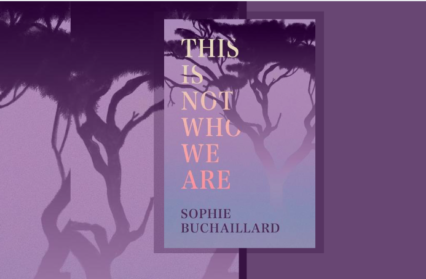Mark Balyney reviews This is Not Who We Are, the debut novel from Sophie Buchaillard which deals with the Rwandan genocide through the lens of lost pen friends.
This is a hard novel to review. Sophie Buchaillard shows, subtly but persuasively, that a politically manufactured difference can have appalling, long-term and unresolved consequences. That is so resonant to our times, so relevant to the issues that we live with daily, that we are instantly sympathetic to Buchaillard’s starting point and aims. Now – let’s backpedal a bit and give some context. This is a novel about the Rwandan genocide of 1994. Over a hundred days, some 800,000 people were killed; the Tutsi population ‘and any Hutu who supported them,’ according to the Foreword. This period of horror was triggered by the Rwandan President’s murder in a shot-down plane.
At the same time, the 16-year-old Buchaillard had a Rwandan pen-pal – a girl called Victoria, the same age, who fled her home for a refugee camp in Zaïre. ‘One day she wrote that she was being moved. After that her letters stopped.’ This novel then is an imagining of what might have happened to Victoria, as a French schoolgirl called Iris wonders what took place and sensitively asks herself if she has the ‘agency’ to write about something she feels her own country partly ‘bore responsibility for’.
That precis is intended to convey some of the strengths and problems of this novel. The literary intent – to view something large, complex and horrific through the eyes of a teenage girl – is laudable. But there are complexities to the complexities. Buchaillard writes very well in the Iris voice but is on uncertain ground in the Victoria voice. She has chosen to rename the ‘I’ voice (it’s Iris not Sophie, because this is not memoir), but Victoria is not renamed.
There’s much fine, restrained writing. ‘Parents see my skin, and they assume I am here to clean their children’s school.’ Or, on boarding a plane, ‘ “This way,’ he directs, as if to be swallowed by a giant metal snake was the most natural thing in the world.’ ” But as Buchaillard herself says in a lengthy (nine-page) afterword, is it her story to tell? She concludes that, on balance, she needs to bear witness. I don’t think the problem is bearing witness; the problem is not creating sufficient distance between the author and the real person, who cannot give consent to this fictionalisation of her life.
At the centre of the novel is Buchaillard’s point, that events in Rwanda were framed ‘in ethno-nationalistic terms, writing about “ethnic Hutu and Tutsi”, perpetuating the lies which made it so easy to ignore and forget.’ That’s an incredibly powerful starting point for a novel but it is not dramatically developed as it could be. Why not (for instance) make one sibling Hutu and the other Tutsi? Then we would have the landscape for context, for an understanding that the conflict was portrayed by Western media as ethnic difference (and thus easier to ignore) but was in fact ‘the result of a carefully planned policy of fearmongering and dehumanisation going back sixty years; instigated by racist (and racialist) policies first introduced during the Belgian colonial rule.’ This material is in the afterword – but it could be used to power the characters.
At a key moment later in the novel, the narrator baulks at the drama and tells, rather than shows, what happened. That is a moment when the novelist’s skills need to come out in force – we need to gasp. Told offstage, pulling punches at the last moment, is a misfire. To have mastery of a project like this, I don’t think it’s unreasonable to say, is a subject better suited for an experienced novelist rather than a first-timer. Even then, to succeed in this task is challenging to the point of – perhaps – impossibility. Edna O’Brien gets herself into a horrible mess with ‘Girl,’ a novel that tries to do similar things in a similar way (bring horrific modern-day results of historical colonialism to a western readership). So at least Buchaillard is in very good company, and we can applaud the ambition.
It’s a novel to be recommended because the subject is so important. We learn a lot. Buchaillard is rightly angry about the how the Rwandan genocide was not given the focus, or the accuracy in telling, by the Western press at the time. Something tells me though, that Buchaillard would have a more powerful book if she had chosen a non-fiction approach. Perhaps that is to come, as things go up a gear in that lengthy author’s note. I will be keen to read Buchaillard’s future work, because I think she’s going to write some very fine books. This isn’t there yet; which is not to dismiss the achievement.
This is Not Who We Are by Sophie Buchaillard is available now via Seren.












